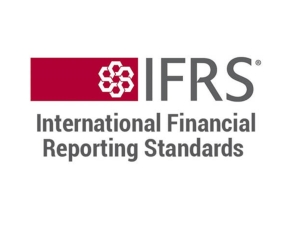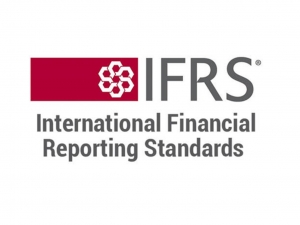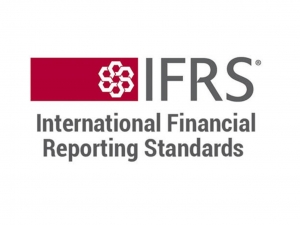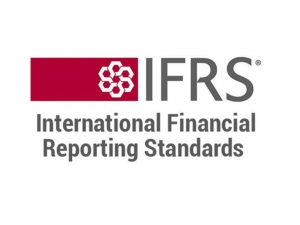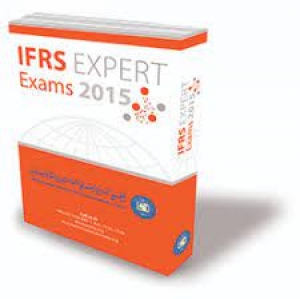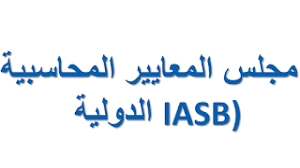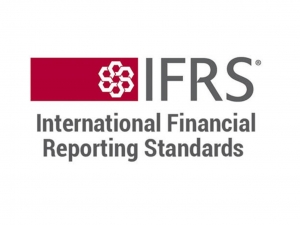عرض العناصر حسب علامة : المعايير الدولية لإعداد التقارير المالية
رسالة دكتوراه: دراسة أثر الانعكاسات الإقتصادية الناتجة عن التوافق مع المعايير الدولية لإعداد التقارير المالية IFRS على مؤشرات الأداء المالي
رسالة دكتوراه عن التقارير المالية وهدف البحث تحليل بعض الإنعكاسات الاقتصادية عن التوافق مع المعايير الدولية لإعداد التقارير المالية على مؤشرات الأداء المالي وكفاءة سوق رأس المال.
تحديث لجنة تفسيرات المعايير الدولية لإعداد التقارير المالية (IFRIC) سبتمبر 2023
تحديث IFRIC هو ملخص للقرارات التي توصلت إليها لجنة تفسيرات المعايير الدولية لإعداد التقارير المالية (اللجنة) في اجتماعاتها العامة.
تحديث ISSB ديسمبر 2022
يسلط تحديث ISSB الضوء على القرارات الأولية لمجلس معايير الاستدامة الدولية (ISSB) يمكن العثور على المشاريع المتأثرة بهذه القرارات في خطة العمل
ندوة عبر الويب قادمة حول طلب الموظفين للحصول على تعليقات على تصنيف الإفصاح عن الاستدامة للمعايير الدولية لإعداد التقارير المالية
تعرف على المزيد حول طلب الموظفين للحصول على تعليقات بشأن تصنيف الإفصاح عن الاستدامة للمعايير الدولية لإعداد التقارير المالية
معلومات إضافية
- البلد عالمي
- نوع الفعالية مجانا
- بداية الفعالية الإثنين, 12 سبتمبر 2022
- نهاية الفعالية الإثنين, 12 سبتمبر 2022
- التخصص محاسبة ومراجعة
- مكان الفعالية اونلاين
تحديث IASB يوليو 2022
يسلط تحديث مجلس معايير المحاسبة الدولية الضوء على القرارات الأولية الصادرة عن مجلس معايير المحاسبة الدولية (IASB).
إصدار النسخة المحدثة من كتاب خبير المعايير الدولية لإعداد التقارير المالية (IFRS Expert)
أصدر المجمع الدولي العربي للمحاسبين القانونيين النسخة المحدثة من كتاب "خبير المعايير الدولية لإعداد التقارير المالية (IFRS Expert)" متضمنا التطورات التي طرأت على معايير المحاسبة الدولية الصادرة عن مؤسسة المعايير الدولية لإعداد التقارير المالية IFRS Foundations.
مجلس معايير المحاسبة الدولية ينشر ملخصاً لمشروعه البحثي منافع التقاعد التي تعتمد على العوائد من الأصول
أصدر مجلس معايير المحاسبة الدولية ملخصاً لمشروعه البحثي منافع التقاعد التي تعتمد على العوائد من الأصول.
تحديث المعايير الدولية لإعداد التقارير المالية (IFRS) للشركات الصغيرة والمتوسطة في مارس 2022
تحديث المعايير الدولية لإعداد التقارير المالية للمنشآت الصغيرة والمتوسطة هو ملخص فريق العمل للأخبار والأحداث والمعلومات الأخرى حول المعايير الدولية لإعداد التقارير المالية للمعايير المحاسبية للشركات الصغيرة والمتوسطة وأنشطة الشركات الصغيرة والمتوسطة ذات الصلة. لم تتم مراجعة ملخص فريق العمل من قبل مجلس معايير المحاسبة الدولية (IASB).
معلومات إضافية
-
المحتوى بالإنجليزية
The IFRS for SMEs Update is a staff summary of news, events and other information about the IFRS for SMEs® Accounting Standard and related SME activities. The staff summary has not been reviewed by the International Accounting Standards Board (IASB).
This edition of the IFRS for SMEs Update includes:
Update on the January 2022 SMEIG meeting
The SMEIG met on 21 January 2022 to discuss some remaining topics in the scope of the second comprehensive review of the IFRS for SMEs Accounting Standard.
The SMEIG report is available here.
Nominations for membership of the SMEIG
Some members of the SMEIG will end their second and final three-year term on 30 June 2022. To fill the positions that will become vacant, in February 2022 the Trustees of the IFRS Foundation published an invitation for nominations of candidates and are now assessing the nominations and applications received by the deadline of 18 March 2022.
Reminder of online resources for SMEs
The IFRS Foundation provides educational materials to support the implementation and application of the IFRS for SMEs Accounting Standard. These materials are available on the Supporting materials for the IFRS for SMEs Accounting Standard page and include:
webcasts, podcasts and webinars;
articles and other publications; and
the IASB’s tentative decisions.
The IFRS Foundation has also made available a package of 35 supporting modules to help those who wish to learn more about the IFRS for SMEs Accounting Standard, particularly those who apply the Standard and users of financial statements that are prepared in accordance with the Standard.
Note from Marta Cristina Pelucio Grecco, SMEIG member
Marta Cristina Pelucio Grecco has a PhD in Business, is President of ANEFAC (National Association of Management, Finance and Accounting Executives in Brazil), a partner of Praesum International Accounting, a professor and researcher at Fipecafi (a foundation of São Paulo University), a member of the Academy of São Paulo Accounting, a participant in several IFRS study groups at the GLASS (Group of Latin American Accounting Standard Setters), at the Brazilian Accounting Pronouncements Committee (CPC) and at the Brazilian Federal Council of Accounting (CFC).
Accounting Standards in Brazil and their alignment with IFRS Accounting Standards
The Brazilian Accounting Pronouncements Committee (CPC) issues accounting standards for Brazilian companies in accordance with IFRS Accounting Standards and the IFRS for SMEs Accounting Standard, which have been enforced by the CFC (national professional accountancy organisation in Brazil) since 2010.
Large companies
Approximately 200,000 Brazilian companies are required by law to present audited financial reports according to IFRS Accounting Standards. Of these, there are public companies regulated by the CVM (Securities and Exchange Commission of Brazil).
Medium-sized companies
Approximately 900,000 Brazilian companies should apply the IFRS for SMEs Accounting Standard. However, a low number of companies are doing so. Application is limited because of a lack of effective enforcement, accountants’ lack of knowledge and the influence of tax—because accountants prefer to follow tax rules and see no advantage in applying accounting standards.
Small and micro-companies
For around 5 million Brazilian micro-companies, the IFRS for SMEs Accounting Standard is too complex, and the CFC issued simplified accounting requirements for micro-companies.
I was part of a CFC study group that identified the need to segregate the 900,000 companies that should apply the IFRS for SMEs Accounting Standard. This is because the reality of a medium-sized company is very different from that of a small company. Thus, as of 2023, Brazil will have the following sets of standards:
IFRS Accounting Standards for large companies;
the IFRS for SMEs Accounting Standard for medium-sized companies;
a standard for small companies; and
a standard for micro-companies.
The two standards for small companies and micro-companies are aligned with the IFRS for SMEs Accounting Standard with some simplifications, which been developed considering the characteristics of these companies and the limitations regarding the availability of financial resources for administrative activities, and therefore are expected to allow the application of these two standards by a larger number of companies.
But we still have a great challenge ahead—to engage SME accountants in regulatory processes and train them so they have adequate knowledge to apply the standards.
Feedback from Brazil about the Second Comprehensive Review of the IFRS for SMEs Accounting Standard
We have been working hard to train accounting professionals and have explained the Request for Information Comprehensive Review of the IFRS for SMEs Standard (RFI) in meetings and workshops. We have also captured feedback from professionals using a survey, which had approximately 120 respondents. These respondents understand that there must be alignment between the principles and concepts in IFRS Accounting Standards and those in the IFRS for SMEs Accounting Standard, so we also use the same alignment approach for Brazilian standards for small companies and micro-companies. Thus, although Brazil has four sets of standards, all are properly aligned with IFRS accounting requirements and serve the public interest.
Regarding some of the RFI’s specific points, the respondents favour aligning the IFRS for SMEs Accounting Standard with IFRS 9 Financial Instruments, by introducing the expected credit loss model, the requirements on hedge accounting, and the definition of a ‘financial guarantee contract’. Likewise, respondents favour aligning the definition of ‘joint control’ and the categories in the Standard with those in IFRS 11 Joint Arrangements.
Most respondents also favour aligning the IFRS for SMEs Accounting Standard with the definition of a ‘business’ in IFRS 3 Business Combinations, as well as including requirements for the accounting treatment of acquisition costs and contingent considerations, and the accounting for acquisitions achieved in stages. Respondents also favour aligning the IFRS for SMEs Accounting Standard with IFRS 16 Leases but are resistant to aligning it with IFRS 15 Revenue from Contracts with Customers.
To generate useful accounting information for small and medium-sized companies, we must continuously engage with and develop accounting professionals. SMEIG is a fundamental actor in this process.


